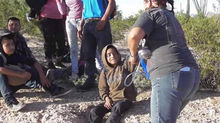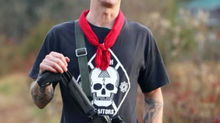WHY SOME MEMBERS OF THE FAR LEFT ADVOCATE AGAINST GUN CONTROL
This article originally ran in the Pacific Standard.

After the tragic massacre in Las Vegas, Nevada, on October 1st, a debate about guns and gun ownership that has become unfortunately commonplace ignited once more. Liberals made their standard argument: More restrictions on gun ownership are necessary (such as stricter regulations on bump stocks and universal background check legislation) to help prevent mass shootings. Those on the right insisted, as they typically do, that tighter gun laws infringe on their Second Amendment right to bear arms. Outside both of these schools of thought, however, lay those on the "left of left"—those with views further left than Democrats—who also have strong opinions on what ought to be done about guns.
While a deep commitment to firearm-ownership rights (and an interest in guns) is typically associated with American conservatives, contingents of the far left also advocate against gun-control laws, though with very different philosophies as to why. On the right, the standard line is that American citizens have a right to bear arms, as guaranteed to some extent by the Second Amendment, in order to protect their families and property from would-be invaders. This rhetoric is demonstrated in Stand Your Ground laws, which have been shown to discriminate against people of color, sometimes with deadly results. But the liberal platform does little to address these concerns in the eyes of the pro-gun far left.
The Democrats take a stricter view on guns, largely supporting restrictions on gun ownership. However, the Democrats' position on gun control does not often directly address the role racism plays in gun control. The far left contends that gun-control laws usually benefit white people the most, and are harmful to people of color. Members of the far left who are interested in arms are wary that new regulations would further discriminate against people of color and the working class.
To shed some light on these far-left views on arms, Pacific Standard spoke with three people on the left of left who have experience with guns. Each is affiliated with groups that in some way advocate responsible gun use, but the views they expressed are their own. Duke Aaron is a member of the Puget Sound chapter of the Redneck Revolt Network, an organization of armed members of the working class that aims to fight white supremacy and promote community defense. Jake Allen is a member of the Trigger Warning Queer & Trans Gun Club, which seeks to "educate and organize queer and trans people for self-defense," according to the group's Facebook page. And Kim Kreiling works in natural resource management in Illinois and helps oversee public hunting grounds.
Why do or don't you own guns?
Duke Aaron: I just like shooting, and I did some rifle team in high school. But I think there's also something important about being able to handle firearms, particularly in such a reactionary environment. Community defense, including armed community defense, isn't about violence. It's about creating a space for people to breathe and get stuff done without being terrorized. Teaching the left and vulnerable communities how to responsibly handle their own safety is important. What are we going to do if something happens? Call the cops and wait [hours] for them to show up and shrug their shoulders or even sometimes shoot us?
Jake Allen: I often refer to myself as a reluctant gun owner. Prior to the election and the corresponding rise in violence from the far right I had little personal interest in firearms. I owned a small rifle, but only because I inherited it when my grandfather passed away. But as the political context that I found myself in changed, so too did my interest in firearms.
Kim Kreiling: I do not personally own a gun because I only manage public hunting grounds, I don't do the hunting. Plus, I have mad archery skills, so I'm set even if I decide to hunt.
What do you see as some of the harms and/or limitations of current gun control legislation?
Aaron: Firearms are legislated like the rest of the country is legislated: completely compromised and geared toward control and capital. Gun laws predominantly favor people who can afford to purchase firearms and gun control has a long history rooted in the idea that white supremacy needs to keep guns out of the hands of people of color. Ronald Reagan and the [National Rifle Association] were perfectly happy to pass the Mulford Act to suppress the rights of the Black Panthers, and that was in the modern day. It's [also] explicit in the Dred Scott decision that arming black folks was a stated fear of the Supreme Court. Pick any one of a thousand examples: Gun control has predominantly been about arming white supremacy and the state and victimizing people of color, women, and immigrants.
Allen: If we're going to call for gun control, we should start with the heavily armed police state. The weapons that ordinary people have access to are small potatoes compared to the firepower that most police departments possess and deploy regularly against society's most marginalized communities. If we're interested in dealing with gun violence, we should begin by addressing society's most violent institution. Beyond disarming police, it's worth remembering the racist history of gun control in the [United States]. More recently, the NRA released a video that seemed to suggest that their members should arm themselves against Black Lives Matter protesters, showing that what is most consistent in their ideology is not the promotion of gun rights, but the maintenance of white supremacy.
Kreiling: The harms of the current gun-control regulations are that they don't actually regulate. There are too many loopholes to get around any sort of attempt at keeping track of who's buying what.
How does the existence of an armed and an increasingly militarized police force factor into your position on guns?
Aaron: It doesn't. I think the militarization of police is one of the most dangerous things happening to our society right now. It will blow up in our faces. It will be a disaster. However, nobody is sensibly learning to use firearms because they think their Glock 19 is an answer to state violence. If we want to talk about gun control from a liberatory perspective, let's start here: Take guns away from cops... at least train them [on] how to de-escalate instead of kill. That is some gun control I could probably get behind. I won't be holding my breath though.
Allen: The police have historically failed to adequately protect the LGBT community, especially queer and trans people of color, and have helped to foment the current crisis of violence and intimidation that queer and trans people face through [the police's] support for Donald Trump. For these reasons, I put little stock in the idea that a more militarized, heavily armed police force will benefit anyone except those with the most power in our society.
Kreiling: Since my position on guns is mainly related to hunting, militarized police force does not really factor in, other than [that] I am not a fan of the direction our police are heading in in general.
Mass shootings in America are not necessarily becoming more common, but one analysis by Politico finds that they are becoming more deadly. The Trace has reported that 53 percent of deadly domestic violence against women includes a gun. What's to be done about these problems? Can tighter restrictions solve them?
Aaron: I'm not going to downplay human tragedy. Mass shootings are despicable and devastating. The fact that we pay more attention to them than the root causes of violence is even more [tragic] though. If you want to look at gun-related issues, then suicide, crime, domestic abuse, and murder by law enforcement are much more problematic than mass shootings from a numbers perspective. But mass shooters are important to look at. They're almost always white men with a history as domestic abusers. Is the problem guns or is it somewhere much more apparent if you look at the details?
Allen: To really address [these] problems, we have to ask a much more fundamental question—what is it about the way that men are socialized in our society that leads them to commit violence against women on such a massive scale? To answer that requires examining and ultimately dismantling larger patriarchal structures in our society.
Kreiling: I believe tighter restrictions will definitely help, but not entirely solve, the epidemic we are facing. Common-sense gun laws to require background checks and gun safety classes along with restricting gun ownership for those convicted of domestic violence or with a history of mental illness is a start, but our whole culture needs to shift to truly put gun violence behind us.
Much has been said about the dangers of guns, or at least some of the people who own them. What's good about guns?
Aaron: I really enjoy the mechanics of shooting. I'm a very devout Buddhist and the same lessons you can apply to Zen archery you can apply to firearms. It's got mechanical skill development, the meditative practice of cleaning and maintenance, and the quiet calm you need to shoot in the right frame of mind. But I like that I can handle firearms and train to be a better defensive firearm owner. I like showing new people how to safely handle firearms as well.
Allen: Guns can be fun. Guns can put food on the table. But, more importantly, at many points in the struggle for human freedom, guns have kept people alive when faced with the terror of the far right. According to Charles E. Cobb, author of This Nonviolent Stuff'll Get You Killed: How Guns Made the Civil Rights Movement Possible, at many points "the willingness to take armed defensive action enabled the civil rights movement to sustain itself" in the midst of night raids from the Klan and white mob violence. As we enter a new era of political polarization, activists and organizers may face similar questions to those that civil rights organizers had to answer: What are we willing to do to keep ourselves and our communities safe? Guns may play a part in answering that question.
Kreiling: As a conservationist, I rely on hunters to help manage wildlife populations. We have removed almost all apex hunters, so we have to fill in that role in order to keep our ecosystems healthy. Specifically in the areas I manage, without hunting, deer populations would get out out of control. This would increase the amount of deer-car collisions, diseases including chronic wasting disease would run rampant, and areas would be stripped of vegetation.



























